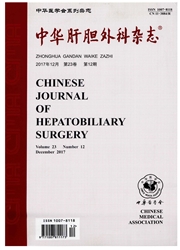

 中文摘要:
中文摘要:
目的 研究羟基磷灰石纳米粒子瘤内注射对兔肝VX2种植瘤生长的影响.方法 将接种VX2肝肿瘤的新西兰白兔随机分成4组,每组10只.A组:肝种植瘤内注入含0.2%羧甲基纤维素钠的生理盐水1 ml;B组:注入20 mg/ml 5-Fu 1 ml;C组:注入20 mg/ml Nano-HAP溶胶1 ml;D组:注入同样浓度5-Fu和Nano-HAP混合液2 ml.四组实验动物于注药后7、14、21 d行肝脏B超扫描,记录生存时间,取肝肿瘤组织病理学检查.结果 术后7、14、21 d A组平均肿瘤体积分别为(4.93±0.76)cm^3、(15.67±2.75)cm^3和(52.36±10.57)cm^3 ; B组为(4.16土0.33)cm^3、(10.26±1.60)cm^3和(18.89±4.65)cm^3;C组为(1.43±0.13)cm^3、(3.69±0.77)cm^3和(9.51±2.09)cm^3;D组为(2.80±0.46)cm^3、(3.77±0.91)cm^3和(8.46±0.95)cm^3.B、C、D三组肿瘤体积均小于同期对照组,D组肿瘤体积最小.四组动物中位生存期分别为34、41、51和44 d.B、C、D三组生存期较对照A组延长.超声监测显示C、D组羟基磷灰石纳米粒子溶胶瘤内注射时可见肿瘤内强回声光点.多次注射后瘤体内可见钙化样强回声光团.HE染色后光镜下观察见A组和B组肿瘤组织出现多处片状坏死,C、D组注射区域呈片状坏死,被条索状或片状钙化灶分隔.结论 羟基磷灰石纳米粒子瘤内注射治疗兔VX2肝肿瘤是安全、可行的,对肿瘤生长有明显的抑制作用,未见毒性反应.
 英文摘要:
英文摘要:
Objective To study the inhibitory effects of hydroxyapatite nanoparticles on liver VX2 tumor in rabbits after intratumoral injection. Methods 40 rabbits with implantation of liver VX2 tumors were randomly divided into 4 groups and intratumorally injected with different preparations.Group A: (control group), 1 ml nomal saline containing 0.2% CMC-Na; Group B: ( 5-Fu group),20 mg/ml 5-Fu 1 ml; Group C: (Nano HAP), 20 mg/ml Nano HAP 1 ml; Group D: (5-Fu+Nano HAP), 20 mg/ml 5-Fu 1 ml and 20 mg/ml Nano HAP 1 ml. Ultrasonography was performed to measure liver tumor volume 7, 14, 21 d after treatment. Survival durations of the animals were recorded. Tumor tissues and liver tissues close to tumor were obtained and examined histologically.Results The average tumor volumes 7, 14 and 21 d after treatment were (4.93 ±0.76)cm^3,(15. 67±2.75)cm^3 and (52. 36±10. 57)cm^3 in group A, (4. 16±0. 33)cm^3 , (10. 26± 1.60)cm^3 and (18. 89±4.65)cm^3 in group B, (1.43±0.13)cm^3 , (3.69±0.77)cm^3 and (9.51±2.09)cm^3 in group C, (2. 80±0.46)cm^3 , (3. 77±0. 91)cm^3 and (8. 46±0.95)cm^3 in group D respectively. The average tumor volumes of groups B, C and D were significantly smaller than that of group A in the same time phases after treatment. The life span of group C was longer than that of other three groups, and there was no statistically significant difference between group B and group D, although the two groups were significantly longer than group A. Blood flow was not detected by color Doppler or power Doppler in group C and group D. Pathological examination showed that there was obvious intratumoral necrosis in group C and D. Tumor in group B exhibited thoroughgoing necrosis. Conclusion Hydroxyapatite nanoparticles intratumoral injection is safe and feasible for treatment of liver tumor. Hydroxyapatite nanoparticles can exert a significant inhibitory effect on liver VX2 tumor growth in rabbits without liver toxicity.
 同期刊论文项目
同期刊论文项目
 同项目期刊论文
同项目期刊论文
 期刊信息
期刊信息
